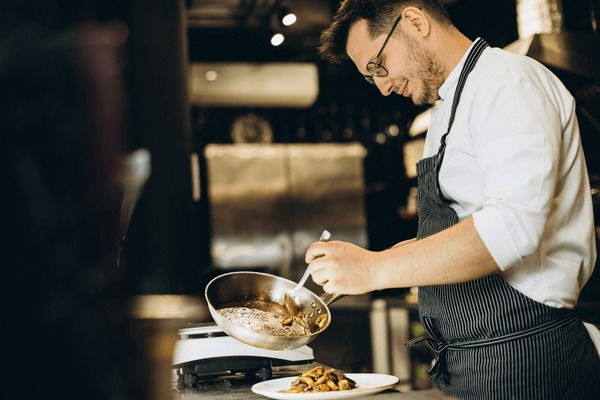
It was a chilly, rain-soaked Thursday evening when Clara slipped quietly behind The Silver Elm, one of the most elite restaurants in Denver.
Water seeped through the cracks of her worn sneakers, and her damp jeans clung tightly to her legs. Her coat, more repair than original material, sagged from her shoulders—but her movements were deliberate and familiar.
Clara had a rule: never beg. She came once a week, always quiet, never pleading. Just a soft knock and a patient wait. Some nights she left with a scrap of sourdough.
Other times, it was a piece of steak someone forgot or a slice of quiche wrapped in wax paper. For her, it wasn’t just about the food—it was proof she still mattered.
Inside the gleaming kitchen, the man behind the dish sink wasn’t just another cook. It was Trevor Langston—the CEO behind the Silver Elm restaurant chain.

Every few months, Trevor would trade his suit for an apron and immerse himself in kitchen work. His board called it immersive branding. He called it staying grounded.
As Trevor rinsed a sauté pan, he heard a faint knock at the back door. A young cook, Eli, glanced over.
“Her again,” Eli muttered under his breath.
“I’ll get it,” Trevor said, drying his hands.
When he opened the door, Clara stood there, soaked and shivering, arms wrapped around herself—not out of shame, but from the cold.

“Any leftovers tonight?” she asked quietly.
Trevor studied her: rain-slicked hair tucked neatly behind her ears, a calm stillness in her expression.
He didn’t say a word. He simply grabbed a paper bag and filled it with herb-roasted chicken, creamy polenta, and a wedge of lemon pie.
Clara stared at the contents, stunned. “Thank you,” she whispered.
“What’s your name?” he asked.
“Clara.”
“You come here often?”
“Just Thursdays. If anything is going spare,” she said with a faint smile.
“Stay warm,” he said softly.

She nodded and disappeared into the rainy night.
But something about her lingered in Trevor’s mind—her quiet dignity, the reverent way she had accepted the meal. On impulse, he followed her.
Keeping a safe distance, Trevor watched Clara navigate narrow alleys and side streets until she slipped behind a crumbling warehouse near the highway. She pulled back a tarp and vanished inside.
Curious and concerned, Trevor moved closer.
Inside, lit by a dim battery-powered lantern, six people sat in a circle—three children, and three adults, including Clara.

With practiced care, she opened the bag and divided the meal evenly. Chicken was shared, polenta ladled into makeshift bowls, pie sliced with a cracked plastic utensil.
Clara didn’t eat until everyone else had.
Trevor stepped back, overwhelmed. The quiet grace he’d witnessed was deeply humbling.
The next morning, he didn’t head to his office. Instead, he returned to the warehouse with hot soup, fresh bread, and a blanket.
He left everything near the entrance with a simple note:
“Not leftovers. Just dinner. —T.”

He came back twice more that week. On the third visit, Clara was waiting.
“You followed me,” she said—not angry, but guarded.
“I had to understand,” Trevor said. “I didn’t know.”
“Why now?” she asked.
“Because I should’ve seen you a long time ago.”
That evening, Clara opened up.
She had once been a teacher, until budget cuts post-COVID cost her the job—and her home.

The kids? Orphans of a friend lost to addiction. The older women? Former neighbors with nowhere to go. That warehouse had become their refuge.
Trevor carried her story with him. The following Monday, he gathered his executives.
“We’re launching something new,” he announced. “Fresh meals, delivered straight from our kitchens to shelters. This isn’t charity—it’s our responsibility.”
The CFO pushed back. “Giving away food isn’t sustainable.”
“What’s not sustainable,” Trevor countered, “is pretending people aren’t starving just beyond our doors.”

The project, Second Harvest, launched that winter. Clara was hired to oversee distribution and made sure others living on the streets were employed too.
By spring, the warehouse stood empty—not because of eviction, but because its residents now had homes. The children returned to school. The older women found care. And Clara?
She stood proudly at the grand opening of Harvest Table, a new community kitchen in Denver. When asked how it all began, she answered with quiet conviction:
“I only ever asked for leftovers,” she said with a smile. “But someone chose to hear me.”




















